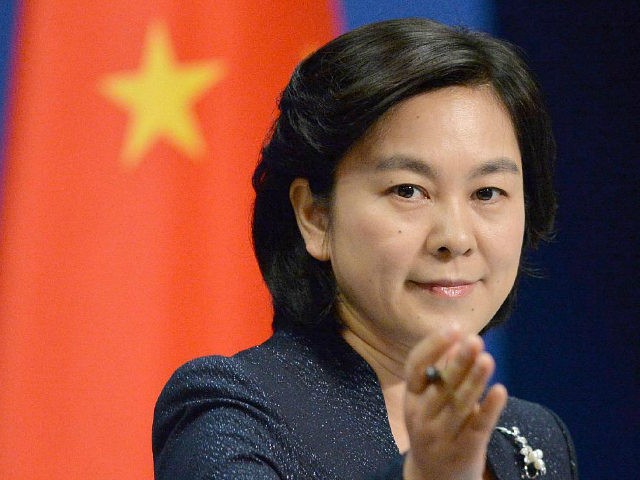The Chinese Foreign Ministry on Wednesday opposed Japan’s proposed release of contaminated wastewater from the Fukushima reactor and suggested shipping the radioactive waste to the United States instead.
“Japan and the U.S. claim that the treated nuclear wastewater from the Fukushima nuclear power plant is in accordance with international safety standards and even drinkable, then why don’t they keep the water for themselves? Or maybe ship it to the U.S.?” Chinese Foreign Ministry spokeswoman Hua Chunying sneered on Twitter.
Hua said in lengthy remarks Tuesday that Japan’s plan for releasing Fukushima wastewater was “highly irresponsible” and demanded international supervision:
Despite doubts and opposition from home and abroad, Japan has unilaterally decided to release the Fukushima nuclear wastewater into the sea before exhausting all safe ways of disposal and without fully consulting with neighboring countries and the international community. This is highly irresponsible and will severely affect human health and the immediate interests of people in neighboring countries.
The oceans are mankind’s shared property. How the wastewater from the Fukushima nuclear power plant is handled is not merely a domestic issue for Japan. We strongly urge the Japanese side to face up to its responsibility, follow the science, fulfill its international obligations and duly respond to the serious concerns of the international community, neighboring countries and its own people. It should reevaluate the issue and refrain from wantonly discharging the wastewater before reaching consensus with all stakeholders and the IAEA through full consultations.
China will continue to watch closely the developments of the matter together with the international community and reserves the right to make further reactions.
Japan announced Tuesday that it plans to begin releasing over a million metric tons of treated radioactive water from the Fukushima Daiichi plant in two years.
The plant was destroyed by an earthquake and tsunami in 2011. Wastewater has been accumulating in gigantic tanks on the site for the past decade, and the tanks are projected to be full sometime in late 2022.
“Before the discharge, the water in tanks will also be sufficiently diluted so that the concentration of tritium will be much lower than Japan’s national regulatory standards, which is compliant with international standards,” the office of Japanese Prime Minister Suga Yoshihide stated Tuesday, adding that the tritium in the water “emits weak radiation” and presents a “very low” risk to health.
Other Japanese officials said all chemicals employed in the treatment process would fall within international standards, and the release would be supervised by the International Atomic Energy Agency (IAEA), which said there has been no adverse environmental impact from comparable previous releases.
Despite these reassurances, the release plan is reportedly unpopular in both Fukushima and Japan at large. South Korea, which has strained diplomatic relations with Japan at the moment, has also objected to the release; Japanese officials pushed back by accusing the South Koreans of hypocrisy because they routinely release treated wastewater with much higher levels of tritium from their four heavy-water nuclear reactors.
Chinese state media lashed out at Japan on Tuesday, calling the Fukushima plan a “shameful decision,” accusing the IAEA of having “no experience” that qualified it to approve of the plan and jeering the United States for supporting the allegedly untrustworthy government in Tokyo.
The state-run Global Times on Tuesday said the U.S. has “indulged” Japan in a “wicked geopolitical performance” because, unlike Japan’s immediate neighbors, it doesn’t care about environmental damage to the Pacific Rim.
“But the US may have miscalculated. With the world’s strongest currents along the coast of Fukushima, radioactive materials could spread to the entire Pacific Ocean. It is purely illusionary and shortsighted for the US to think it could detach itself from the possible crisis,” the Global Times warned.
Another Global Times editorial cited South Korea’s opposition, and criticism from some Japanese commentators, to encourage other Asia-Pacific nations to “work together to make sure the release is under international supervision, and reserve the right to sue Japan according to relevant international laws once Tokyo’s act causes damages and pollution.”
The Chinese Communist paper claimed U.S. support for Tokyo proves the American concept of a “rules-based international order” is “actually a lie which only serves US strategic interests but ignores the concern of other countries, even US allies like South Korea.”
“Japan dares to make a deal with the US on the nuclear matter which will impact the marine environment shared by the world, so Tokyo is unqualified to ask the international community for trust, and its ‘transparency’ is not convincing,” the Global Times huffed.

COMMENTS
Please let us know if you're having issues with commenting.